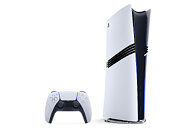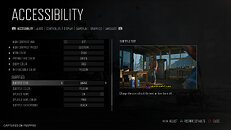Apr 24th, 2025 18:56 EDT
change timezone
Latest GPU Drivers
New Forum Posts
- New OLED monitor makes PC unresponsive sometimes (12)
- 5060 Ti 8GB DOA (269)
- RX 9000 series GPU Owners Club (514)
- [PC Build] Code name "FULL RETARD" (51)
- How is my CPU's temperature? (22)
- Are the 8 GB cards worth it? (167)
- New GPU 5070 Ti or better CPU Ryzen7 7800X3D ? (28)
- Last game you purchased? (793)
- What are you playing? (23458)
- random system shutdown with fans running at full speed (59)
Popular Reviews
- NVIDIA GeForce RTX 5060 Ti 8 GB Review - So Many Compromises
- Crucial CUDIMM DDR5-6400 128 GB CL52 Review
- Colorful iGame B860M Ultra V20 Review
- ASUS GeForce RTX 5060 Ti TUF OC 16 GB Review
- ASRock X870E Taichi Lite Review
- Upcoming Hardware Launches 2025 (Updated Apr 2025)
- Sapphire Radeon RX 9070 XT Pulse Review
- Sapphire Radeon RX 9070 XT Nitro+ Review - Beating NVIDIA
- AMD Ryzen 7 9800X3D Review - The Best Gaming Processor
- NVIDIA GeForce RTX 5060 Ti PCI-Express x8 Scaling
Controversial News Posts
- NVIDIA GeForce RTX 5060 Ti 16 GB SKU Likely Launching at $499, According to Supply Chain Leak (182)
- NVIDIA Sends MSRP Numbers to Partners: GeForce RTX 5060 Ti 8 GB at $379, RTX 5060 Ti 16 GB at $429 (127)
- NVIDIA Launches GeForce RTX 5060 Series, Beginning with RTX 5060 Ti This Week (115)
- Nintendo Confirms That Switch 2 Joy-Cons Will Not Utilize Hall Effect Stick Technology (105)
- Nintendo Switch 2 Launches June 5 at $449.99 with New Hardware and Games (99)
- Sony Increases the PS5 Pricing in EMEA and ANZ by Around 25 Percent (85)
- NVIDIA PhysX and Flow Made Fully Open-Source (77)
- Windows Notepad Gets Microsoft Copilot Integration (75)
News Posts matching #PlayStation 5
Return to Keyword BrowsingLead the Expedition. Break the Cycle. Clair Obscur: Expedition 33 Is Out Now
Clair Obscur: Expedition 33, the highly-anticipated debut by French independent studio Sandfall Interactive, and published by Kepler Interactive (Tchia, Sifu, Pacific Drive), is now available to purchase worldwide on PlayStation 5, Xbox Series X|S (available now with Xbox Game Pass) and PC via Steam and Epic Games Store.
Featuring an original, fantasy world inspired by Belle Époque France, Expedition 33 delivers an emotional, cinematic story brought to life by an incredible voice cast of both video game and cinematic talent in both English and French, including Charlie Cox, Jennifer English, Ben Starr and Andy Serkis. Featuring innovative reactive turn-based battles and deep character build customization, players will embark on a journey across a world of wonder filled with stunning locations, secrets and challenging side content, connected by a fully navigable explorable world map.
Featuring an original, fantasy world inspired by Belle Époque France, Expedition 33 delivers an emotional, cinematic story brought to life by an incredible voice cast of both video game and cinematic talent in both English and French, including Charlie Cox, Jennifer English, Ben Starr and Andy Serkis. Featuring innovative reactive turn-based battles and deep character build customization, players will embark on a journey across a world of wonder filled with stunning locations, secrets and challenging side content, connected by a fully navigable explorable world map.
Once Upon a Puppet is Out Now
Take a bow! The hand-crafted world of Once Upon a Puppet takes center stage today as the game officially launches on PC (Steam), PlayStation 5, Xbox Series X|S, and Steam Deck. The Nintendo Switch version will be released early June 2025, giving players just a bit more time before the curtains rise on the portable stage. We will be updating you on the exact release date in the coming weeks.
Developed by Flatter Than Earth and published by Daedalic Entertainment, Once Upon a Puppet invites players into a magical theatrical realm full of danger, discovery, and unexpected transformations. Combining inventive thread-based mechanics, dual-character puzzles, and a rich, hand-animated world, the game offers a heartfelt and eerie journey through a forgotten puppet kingdom.
Developed by Flatter Than Earth and published by Daedalic Entertainment, Once Upon a Puppet invites players into a magical theatrical realm full of danger, discovery, and unexpected transformations. Combining inventive thread-based mechanics, dual-character puzzles, and a rich, hand-animated world, the game offers a heartfelt and eerie journey through a forgotten puppet kingdom.

Ghost of Yotei Gets October 2 PS5 Exclusive Release Date with $249.99 Collector's Edition
Ghost of Yōtei's release date has finally been confirmed as October 2 of this year. Sony Entertainment today announced the October 2 release date, which is slated to be exclusive to the PlayStation 5 console for the time being, alongside new special editions of the upcoming action-adventure game. All pre-orders for Ghost of Yōtei, which start on May 2 at 10:00 AM, will include seven PSN avatars—representing Atsu and the Yōtei Six—and an in-game mask cosmetic. The base game will cost $69.99, while the $79.99 Digital Deluxe Edition will include the full digital base game, four cosmetic unlocks, and an early unlock for the Travelers Map. The Collector's Edition bundle will include an array of physical collectibles—a replica of Atsu's mask from the game, a sash, tsuba, art cards, zeni hajiki coin game and pouch, and a papercraft ginko tree—along with the same in-game items as included in the Digital Deluxe Edition. All of that comes at a whopping $249.99.
Sucker Punch also released a new trailer for Ghost of Yōtei, which reveals the villainous Yōtei Six and their brutal slaughter of Atsu's people, which serve as the motivation for her revenge story. It's unclear when Ghost of Yōtei will expand to PC and other console gaming platforms, but speculation suggests that 2027 is the earliest we will see a cross-platform launch for the Ghost of Tsushima sequel. Previous reports also indicated that there will be a Ghost of Tsushima expanded universe, with possible TV and movie spin-offs on the cards.
Sucker Punch also released a new trailer for Ghost of Yōtei, which reveals the villainous Yōtei Six and their brutal slaughter of Atsu's people, which serve as the motivation for her revenge story. It's unclear when Ghost of Yōtei will expand to PC and other console gaming platforms, but speculation suggests that 2027 is the earliest we will see a cross-platform launch for the Ghost of Tsushima sequel. Previous reports also indicated that there will be a Ghost of Tsushima expanded universe, with possible TV and movie spin-offs on the cards.

Sony PlayStation 5 Pro Lead Designers Perform Official Teardown of Flagship Console
PlayStation 5 Pro console—the most innovative PlayStation console to date—elevates gaming experiences to the next level with features like upgraded GPU, advanced ray tracing, and PlayStation Spectral Super Resolution (PSSR) - an AI-driven upscaling that delivers super sharp image clarity with high framerate gameplay. Today we're providing a closer look at the console's internal architecture, as Sony Interactive Entertainment engineers Shinya Tsuchida, PS5 Pro Mechanical Design Lead and Shinya Hiromitsu, PS5 Pro Electrical Design Lead, provide a deep-dive into the console's innovative technology and design philosophy.
Note: in this article, we refer to the PlayStation 5 model released in 2020 as the "original PS5," the PS5 released in 2023 as the "current PS5," and the PS5 Pro released in 2024 as the "PS5 Pro." Do not try this at home. Risk of fires, and exposure to electric shock or other injuries. Disassembling your console will invalidate your manufacturer's guarantee.
Note: in this article, we refer to the PlayStation 5 model released in 2020 as the "original PS5," the PS5 released in 2023 as the "current PS5," and the PS5 Pro released in 2024 as the "PS5 Pro." Do not try this at home. Risk of fires, and exposure to electric shock or other injuries. Disassembling your console will invalidate your manufacturer's guarantee.
Athena Worlds Announces Xenomorph, a Spiritual Sequel to Alien Vs Predator
Athena Worlds, a video games studio founded by video games veterans of titles such as Alien Vs Predator, Forza Horizon, Goldeneye N64, The Sims, Microsoft Flight Simulator and a slew of chart-topping games are proud to announce "Xenomorph."
Alien Vs Predator for Atari, defined Jane Whittaker's career. It also defined a genre, often regarded as the first true survival game, with over 100 awards and recently honored with number 3 in the top 10 scariest games of all-time awards. It spawned an enduring franchise. AvP for the Atari Jaguar was programmed by Mike Beaton (3D engine / gameplay designer) and Jane (AI and gameplay programmer/designer) and produced by James Purple Hampton. It is no exaggeration to say this cult classic changed the face of gaming.
Alien Vs Predator for Atari, defined Jane Whittaker's career. It also defined a genre, often regarded as the first true survival game, with over 100 awards and recently honored with number 3 in the top 10 scariest games of all-time awards. It spawned an enduring franchise. AvP for the Atari Jaguar was programmed by Mike Beaton (3D engine / gameplay designer) and Jane (AI and gameplay programmer/designer) and produced by James Purple Hampton. It is no exaggeration to say this cult classic changed the face of gaming.
Steel Seed Launches Today on PC, PlayStation 5 & Xbox Series X|S
Today ESDigital Games and developer Storm in a Teacup are excited to release Steel Seed, the new stealth-action game set in a dark sci-fi world where humanity stands on the brink of extinction. Available today on PC via Steam and the Epic Games Store, PlayStation 5, and Xbox Series X|S for $39.99 (with an additional 15% launch discount available on PC, Xbox, and PlayStation for PlayStation Plus subscribers), Steel Seed is a gripping action-adventure experience from the visionary team behind the critically acclaimed Close to the Sun.
Steam and Epic Games Store players can also grab the Deluxe Edition of Steel Seed today for $44.99 (with an additional 15% launch discount available), which includes the game's 15-track digital OST composed by Andrea Remini, a digital artbook, two unique in-game costumes, and 23 HD wallpapers. The Deluxe Edition will be available digitally on PlayStation 5 and Xbox Series X|S, alongside a physical edition of Steel Seed on PlayStation 5, starting May 23.
Steam and Epic Games Store players can also grab the Deluxe Edition of Steel Seed today for $44.99 (with an additional 15% launch discount available), which includes the game's 15-track digital OST composed by Andrea Remini, a digital artbook, two unique in-game costumes, and 23 HD wallpapers. The Deluxe Edition will be available digitally on PlayStation 5 and Xbox Series X|S, alongside a physical edition of Steel Seed on PlayStation 5, starting May 23.

Bend Studio Lead Outlines Days Gone Remastered Accessibility Features
With the launch of Days Gone Remastered—for PlayStation 5 and PC—just around the corner, we're excited to spotlight our expanded suite of accessibility features. Taking the foundation of our baseline list from Days Gone in 2019, we made it a priority to evolve and improve accessibility to make the player's experience more accessible and customizable when hitting the Broken Road on April 25. Let's dive right in!
Visual features
Subtitle customization is now vaster than ever before in Days Gone. We added a total of 11 subtitle colors for you to choose based on your preference, which can also be used for the speaker's name. Want to mix and match? No problem! Choose the subtitle text to be one color and the speaker's name to be another color. On top of color customization, we also expanded the options for subtitle background. Originally, this could only be toggled on or off. Now, you can select between default (transparent), darkened, light, and black.
Visual features
Subtitle customization is now vaster than ever before in Days Gone. We added a total of 11 subtitle colors for you to choose based on your preference, which can also be used for the speaker's name. Want to mix and match? No problem! Choose the subtitle text to be one color and the speaker's name to be another color. On top of color customization, we also expanded the options for subtitle background. Originally, this could only be toggled on or off. Now, you can select between default (transparent), darkened, light, and black.

EA & Lucasfilm Games Announce Star Wars Zero Company, a Turn-Based Tactics Game Set in the Clone Wars
At Star Wars Celebration Japan, Electronic Arts Inc. revealed Star Wars Zero Company, a single-player turn-based tactics game developed by Bit Reactor in collaboration with Respawn Entertainment and Lucasfilm Games. In Star Wars Zero Company, players will step into the shoes of Hawks, a former Republic officer, to command an elite squad of cunning operatives through a gritty and authentic story set in the twilight of the Clone Wars. As an unconventional outfit of professionals for hire hailing from across the galaxy, Zero Company must set aside their differences to overcome nearly impossible odds and take on an emerging threat that will consume the galaxy if left unchecked.
"Our vision for Star Wars Zero Company is grounded in gameplay design pillars that weave in the immersive Star Wars galaxy with engaging turn-based tactics gameplay," said Greg Foertsch, CEO and Creative Director at Bit Reactor. "It's our aim to deliver a game with an original Star Wars story from the Clone Wars era that has meaningful outcomes from player choices, and deep turn-based tactical combat with an approachable and cinematic presentation."
"Our vision for Star Wars Zero Company is grounded in gameplay design pillars that weave in the immersive Star Wars galaxy with engaging turn-based tactics gameplay," said Greg Foertsch, CEO and Creative Director at Bit Reactor. "It's our aim to deliver a game with an original Star Wars story from the Clone Wars era that has meaningful outcomes from player choices, and deep turn-based tactical combat with an approachable and cinematic presentation."
Bionic Bay Out Now on PC & PlayStation 5
Speed running scientists and challenge hunters, rejoice. After years of crafting, your invitation to Bionic Bay is now available on Steam and PlayStation 5. It began with a chance meeting on Reddit, and now the Bionic Bay story continues with you, our trusted Research Participants. In Bionic Bay you'll master the art of teleportation, control the very fabric of time itself, manipulate gravity and navigate a path filled with dangers. Our team will provide you with the tools you'll need to traverse this intricately crafted pixel art world. But don't let the stunning visuals fool you, this is no slow-moving narrative crawl. The best way to navigate Bionic Bay is with fast movements, precise controls, exceptional timing, puzzle solving intuition and just maybe a little bit of luck.
What you've seen in the Bionic Bay demo is just the beginning. Bionic Bay v1.0 includes 23 painstakingly created levels, with an increasing challenge to simply stay alive through your journey. Importantly, however, the path can be as helpful as it is dangerous, and Research Participants will need to judge the way ahead accordingly. In addition to the main game, we've also developed the Bionic Bay Online mode, with a dedicated build for speed runners and those hungry for a challenge. In this demanding arena, you'll have the opportunity to customize your own scientist, and claim your place on our transient and global leaderboards.
What you've seen in the Bionic Bay demo is just the beginning. Bionic Bay v1.0 includes 23 painstakingly created levels, with an increasing challenge to simply stay alive through your journey. Importantly, however, the path can be as helpful as it is dangerous, and Research Participants will need to judge the way ahead accordingly. In addition to the main game, we've also developed the Bionic Bay Online mode, with a dedicated build for speed runners and those hungry for a challenge. In this demanding arena, you'll have the opportunity to customize your own scientist, and claim your place on our transient and global leaderboards.

Bend Studio Lead Discusses Days Gone Remastered's Speedrun & Permadeath Modes
Welcome—or welcome back—to Days Gone, Bend Studio's sprawling open-world adventure-survival epic. In this PlayStation 5/PC remaster launching April 25, you'll once again be able to enjoy Deacon St. John's journey across the gorgeous natural beauty of the Oregon wilderness-provided you can deal with the mind-boggling amount of mutant Freaker monstrosities that want to shred you into tiny little chunks. We reached out to Kevin McAllister, Creative and Product Lead at Bend Studio, for some additional details about the anticipated remaster, including its notable new additions. So grab your survival gear, gas up your bike, and read on to hear about how Days Gone is better than ever on the PlayStation 5 (and PC).
Back in the days
We first asked how Bend Studio feels about revisiting their flagship game: "Days Gone is a special game for us," says McAllister. "It's a special game to our players, too. We got the opportunity to remaster a game that we released originally on the PS4 in 2019 and ported to the PC in 2021. Six years after the original, technology has improved-we have the power of the PS5 now. There was a lot more we could do to showcase the game's potential." We then asked about how the PlayStation 5's capabilities are enhancing the Days Gone experience. "The graphical improvements we've made-you'll see the difference," McAllister explains. "There's increased lighting, increased shadow quality, increased fog depth. For example, nighttime is now darker; the moon is more natural-looking. The blue sky is more natural, too-Days Gone is a very realistic-looking game. And we've taken that to a new level with the PS5." Sounds like a great fit for the remaster's new-and-improved Photo Mode, with more lighting options and instant day-and-night switches for beautiful environmental photography.
Back in the days
We first asked how Bend Studio feels about revisiting their flagship game: "Days Gone is a special game for us," says McAllister. "It's a special game to our players, too. We got the opportunity to remaster a game that we released originally on the PS4 in 2019 and ported to the PC in 2021. Six years after the original, technology has improved-we have the power of the PS5 now. There was a lot more we could do to showcase the game's potential." We then asked about how the PlayStation 5's capabilities are enhancing the Days Gone experience. "The graphical improvements we've made-you'll see the difference," McAllister explains. "There's increased lighting, increased shadow quality, increased fog depth. For example, nighttime is now darker; the moon is more natural-looking. The blue sky is more natural, too-Days Gone is a very realistic-looking game. And we've taken that to a new level with the PS5." Sounds like a great fit for the remaster's new-and-improved Photo Mode, with more lighting options and instant day-and-night switches for beautiful environmental photography.
Forever Skies Version 1.0 Out Now on PC & PlayStation 5
Greetings scientists…Well today is the day when Far From Home can proudly announce that Forever Skies 1.0 is officially out now on Steam! Our game has been in Early Access for almost two years (22 months), and today it launches with brand-new content and a whole host of QOL, performance and bug fixes. First off, check out our launch trailer below! Forever Skies is a first-person survival game set on a post-apocalyptic, ecologically ruined Earth. Play solo or with up to 3 friends as you build, upgrade, and fly a high-tech airship. Scavenge resources, craft tools, and face dangers on the surface as you hunt for a cure to save humanity.
SOUL MASK, ALOFT AND PLANET CRAFTER
To mark the occasion of our launch, we've partnered up with our friends to create some great survival co-op gaming bundles. So if you or your friends already own Soul Mask, Planet Crafter, or Aloft, you can use these bundles to get an additional 10% off Forever Skies or vice versa.
SOUL MASK, ALOFT AND PLANET CRAFTER
To mark the occasion of our launch, we've partnered up with our friends to create some great survival co-op gaming bundles. So if you or your friends already own Soul Mask, Planet Crafter, or Aloft, you can use these bundles to get an additional 10% off Forever Skies or vice versa.
Duskfade: A New 3D Action-Platformer Inspired by the Classics Coming 2026
Fireshine Games is delighted to introduce Duskfade, an all-new 3D action-platformer inspired by classic platformers of times gone by, coming to the PlayStation 5 (PS5) system, Xbox Series X|S, and PC in 2026.
Embark on an unforgettable adventure as Zirian, a young workshop apprentice, as he sets out to restore time itself in a world enshrouded by eternal night. Shatter the shackles of time as you jump, swing, and slash through a vibrant clockpunk world, blending nostalgia with modern gameplay in this timeless love letter to action-platformer classics.
Embark on an unforgettable adventure as Zirian, a young workshop apprentice, as he sets out to restore time itself in a world enshrouded by eternal night. Shatter the shackles of time as you jump, swing, and slash through a vibrant clockpunk world, blending nostalgia with modern gameplay in this timeless love letter to action-platformer classics.
Blue Prince's Lead Developer Explores Indie Project's Puzzle Mechanics
If you have ever found yourself in an unfamiliar room, staring at a closed door and wondering what lies beyond it, then you are already familiar with the mysterious driving force of Blue Prince. Will this door lead to a twisting passageway? A quiet bedroom? Or a grand ballroom? My name is Tonda Ros, an indie developer with a love for atmospheric games, and for the last eight years, I have been working on a game about a large manor and its many mysterious doors. Blue Prince was formed from big ideas from very different worlds. It has elements of mystery, strategy and discovery, merging the world of a first-person puzzle adventure with the drafting mechanics of a tabletop card game. It also launches April 10 as a day one PlayStation Plus Game Catalog title. Other launch platforms include: Xbox Series X/S and Windows PC (Steam).
But how exactly does the game work?
Floor plan drafting: when my own journey began almost a decade ago, I had one simple idea: "Every door is a choice." In a way, these five words sum up the entirety of Blue Prince. The estate of Mount Holly is not an ordinary house. This is a manor of shifting rooms and ever-changing expectations. And in this house, each door you open can lead to one of three different rooms. The choice is up to you. Do you want a storeroom to gain useful tools? A library to search for more clues? Or perhaps simply a long hallway, to grant yourself even more doors to continue your exploration? As you make your decision and open the door, you are instantly met with the room of your choosing.
But how exactly does the game work?
Floor plan drafting: when my own journey began almost a decade ago, I had one simple idea: "Every door is a choice." In a way, these five words sum up the entirety of Blue Prince. The estate of Mount Holly is not an ordinary house. This is a manor of shifting rooms and ever-changing expectations. And in this house, each door you open can lead to one of three different rooms. The choice is up to you. Do you want a storeroom to gain useful tools? A library to search for more clues? Or perhaps simply a long hallway, to grant yourself even more doors to continue your exploration? As you make your decision and open the door, you are instantly met with the room of your choosing.

Days Gone Remastered's Horde Assault Mode Previewed by Bend Studio
Days Gone Remastered comes to PlayStation 5 on April 25. Experience the definitive version of Days Gone with new modes, features, and technical enhancements to leverage the PS5 and PS5 Pro consoles. The new game modes including Horde Assault, Permadeath, and Speedrun—also arriving on PC; via the Broken Road DLC. Whether you're visiting Days Gone for the first time or jumping back on the Drifter bike, there's plenty of content to explore and new things to discover. If you haven't already, be sure to read our Days Gone Remastered announcement post for more details on all the new content and features. Introducing one of our most expansive new additions to Days Gone Remastered, Horde Assault—a survival arcade mode. Before we dive in, watch the gameplay trailer for the new mode below.
What is Horde Assault mode?
Horde Assault offers fresh and unexpected gameplay designed to challenge your skills as you try to achieve a high score, while surviving as long as possible against increased horde sizes and various other enemies, like Breakers, Reachers, and Rager bears, oh my! Fight your way through a brutal, ever-changing landscape where enemies escalate in difficulty the longer you survive. Horde Assault was built from the promise of "This World Comes For You," showcasing the core gameplay of the Days Gone open world in a unique way. Horde Assault is your playground for a truly endless game mode, go show them Freakers who's boss.
What is Horde Assault mode?
Horde Assault offers fresh and unexpected gameplay designed to challenge your skills as you try to achieve a high score, while surviving as long as possible against increased horde sizes and various other enemies, like Breakers, Reachers, and Rager bears, oh my! Fight your way through a brutal, ever-changing landscape where enemies escalate in difficulty the longer you survive. Horde Assault was built from the promise of "This World Comes For You," showcasing the core gameplay of the Days Gone open world in a unique way. Horde Assault is your playground for a truly endless game mode, go show them Freakers who's boss.
Reikon Games Introduces its "Metal Eden" Demo, Taster Build Out Now on PC & Modern Consoles
Starting today, you can dive into the sci-fi FPS action of Metal Eden with our brand-new demo available for PC, Xbox Series X|S, and PlayStation 5—grab it on your platform of choice. We can't wait to see you experience the adrenaline rush we have in store for you while you navigate the city-planet of Moebius as it orbits the planet Vulcan. During the demo, you'll jump into Mission 0 and Mission 1 and have a chance to experiment with some of the weapons that will help you cause havoc and uncover the truth of Moebius—master these upgrades, and no foe will be able to stop you. But first a reminder of why you fight…
For humanity to survive space travel and expand across the galaxy, the Engineers invented Cores. This system can store human data by preserving a digital record of a human psyche, rebuilding it upon reaching its destination. That was the plan, however something went wrong. An erosion bomb was released by the Engineers, threatening all cores on Moebius.
For humanity to survive space travel and expand across the galaxy, the Engineers invented Cores. This system can store human data by preserving a digital record of a human psyche, rebuilding it upon reaching its destination. That was the plan, however something went wrong. An erosion bomb was released by the Engineers, threatening all cores on Moebius.

Bungie Schedules "Marathon Gameplay Reveal Showcase" - Airing on April 12
The time has come—we're getting ready to share the first look at Marathon in this week's Gameplay Reveal Showcase! Join us on Saturday, April 12 @ 10AM PT from Bungie HQ, where we'll be revealing gameplay for the first time along with a few other surprises. Game director Joe Ziegler, franchise art director Joseph Cross, senior design lead Lars Bakken, gameplay director Andrew Witts, and senior social media manager Andy Salisbury will be sitting down to chat about everything we're sharing, and we'll be doing live Q+A from Twitch chat throughout the show.
Puzzles, decryption, and hacks
Over the last few days, the community has been sluething their way through encrypted puzzles and messages intercepted by the resistance group, MIDA. We'd like to recognize the collaborative hacking efforts of you all here today. Curious what's been happening behind closed signals? Here's the quick recap of what transpired across multiple days, social platforms, and websites.
Puzzles, decryption, and hacks
Over the last few days, the community has been sluething their way through encrypted puzzles and messages intercepted by the resistance group, MIDA. We'd like to recognize the collaborative hacking efforts of you all here today. Curious what's been happening behind closed signals? Here's the quick recap of what transpired across multiple days, social platforms, and websites.
"Space Adventure Cobra - The Awakening" Reveals Exciting New Trailer
Microids is excited to reveal an all-new trailer for Space Adventure Cobra - The Awakening, a thrilling video game adaptation of the iconic animated series produced by TMS, which itself is based on the beloved manga by Buichi Terasawa. Set to launch on August 26, 2025, the game will be available on PlayStation 5, Xbox Series X|S, Nintendo Switch, and PC.
Developed by the talented studio Magic Pockets, this game will offer players around the world a unique opportunity to relive the thrilling adventures of Cobra by exploring the first 12 episodes of the series, featuring one of its most iconic arcs: the Captain Nelson's treasure.
Developed by the talented studio Magic Pockets, this game will offer players around the world a unique opportunity to relive the thrilling adventures of Cobra by exploring the first 12 episodes of the series, featuring one of its most iconic arcs: the Captain Nelson's treasure.
Rebellion's Atomfall is Out Now
Rebellion, the independent video game studio behind the smash hit Sniper Elite and Zombie Army franchises, has today launched Atomfall. The game is available to play now on Game Pass, as well as purchase for Xbox Series X/S, Xbox One, Windows PC and PC via Steam and Epic Games Store, PlayStation 5 and PlayStation 4. Atomfall is also Certified on Steam Deck. UK-based post-apocalyptic survival-action game, Atomfall is inspired by the real life Windscale nuclear incident in the 1950s. Players will embark on a fictionalized adventure meeting a cast of weird and wonderful characters as they try to uncover the mystery of what happened at the Atom Plant and escape the Quarantine Zone. Atomfall's Standard Edition is available digitally, as well as in a boxed physical edition for consoles published by Fireshine Games.
Atomfall's Deluxe Edition is available digitally. This Deluxe Edition gives players the Basic Supply Bundle DLC, that offers additional items and supplies to uncover as you explore, including an exclusive melee weapon variant, additional loot caches and an item recipe. It also gives players an Enhanced Supply Bundle, which includes an exclusive pistol variant, metal detector skin and character upgrades. Alongside this, players will also enjoy access to the Story Expansion Pack: Wicked Isle DLC when released. Players who purchase the Standard Edition can purchase the Deluxe Upgrade to enjoy the same additional content.
Atomfall's Deluxe Edition is available digitally. This Deluxe Edition gives players the Basic Supply Bundle DLC, that offers additional items and supplies to uncover as you explore, including an exclusive melee weapon variant, additional loot caches and an item recipe. It also gives players an Enhanced Supply Bundle, which includes an exclusive pistol variant, metal detector skin and character upgrades. Alongside this, players will also enjoy access to the Story Expansion Pack: Wicked Isle DLC when released. Players who purchase the Standard Edition can purchase the Deluxe Upgrade to enjoy the same additional content.
Sunderfolk, a Tactical Tabletop-Inspired Adventure Launches on April 23
Dreamhaven development studio Secret Door today announced Sunderfolk, a tactical co-op adventure inspired by a deep love of tabletop gaming, will launch on Steam, PlayStation 5, Xbox Series X|S, and Nintendo Switch on April 23, 2025, for $49.99 USD. Future heroes of the Sunderlands can wishlist the game now on Steam, the PlayStation Store, Xbox, and the Nintendo eShop. Players eager to try the game can play the free, exclusive First Look Demo on the NVIDIA GeForce NOW cloud gaming service, available today through April 7.
Sunderfolk's First Look Demo showcases the game's early experience with all playable characters unlocked. Players can replay the demo to experiment with different character combinations and gameplay strategies. Be among the first to try it with NVIDIA GeForce NOW. To access the demo, players can simply create a membership with NVIDIA GeForce NOW and launch Sunderfolk, along with the Sunderfolk mobile app to use as the game's controller. Signing up for an NVIDIA GeForce NOW membership is free-no paid membership is required to play Sunderfolk's First Look Demo.
Sunderfolk's First Look Demo showcases the game's early experience with all playable characters unlocked. Players can replay the demo to experiment with different character combinations and gameplay strategies. Be among the first to try it with NVIDIA GeForce NOW. To access the demo, players can simply create a membership with NVIDIA GeForce NOW and launch Sunderfolk, along with the Sunderfolk mobile app to use as the game's controller. Signing up for an NVIDIA GeForce NOW membership is free-no paid membership is required to play Sunderfolk's First Look Demo.
Remedy Entertainment Showcases FBC: Firebreak's Altered Augments System
Hi everyone, I'm Julius Fondem, Community Manager here at Remedy Entertainment. Today I'm very excited, jazzed even, to talk to you about a brand-new feature in our upcoming game FBC: Firebreak—Altered Augments. If you're not familiar with FBC: Firebreak, it's a cooperative first-person shooter for three players set within a mysterious federal agency under assault by extradimensional forces, in the iconic Control universe. Battle through hordes of otherworldly monsters with up to two friends, customize your gear and level up as you fight back against this ever-growing threat.
This being our first multiplayer, we're very excited to bring it to you, the community, and to that end, we've designed FBC: Firebreak to be as easy as possible to get into. This is a game best played together with your friends, having a great time laughing while chaotic and wacky things happen! This isn't a new hobby that you need to log onto every day for rewards. None of that FOMO stuff here. Just get together with your friends over the weekend for a good time.
This being our first multiplayer, we're very excited to bring it to you, the community, and to that end, we've designed FBC: Firebreak to be as easy as possible to get into. This is a game best played together with your friends, having a great time laughing while chaotic and wacky things happen! This isn't a new hobby that you need to log onto every day for rewards. None of that FOMO stuff here. Just get together with your friends over the weekend for a good time.

Ruffy and the Riverside Launches on PS5 June 26, Release on PC "Coming Soon"
My name is Patrick, and I am the Art Director for Zockrates Laboratories, the indie studio currently developing Ruffy and the Riverside. Together with our publisher, Phiphen Games, we are proud to announce that Ruffy and the Riverside will be released on PlayStation 5 on June 26, 2025. We are happy to contribute to Playstation's tradition of representing innovative and unique gameplay.
A platformer adventure with unique gameplay
Ruffy and the Riverside is a platformer adventure with truly unique gameplay. When Ruffy isn't jumping, running, skating, or gliding, he is using his unique Swap ability. With the Swap, you can copy and paste textures to change the game world, solve puzzles, beat enemies, and eventually save the world. Just grab a texture and throw it somewhere else, and the world will change! It is as easy as it sounds and has huge impacts: Transform water into ice to cross an ocean. Throw a climbing vine onto a waterfall, and you can climb up. With the Swap, you can exchange materials, symbols, the sun for the moon, and all colors. If you color birds the same color, they might end up as a couple. Apples are more yummy when they are red, and some bushes will drop coins if they have a golden look. Of course, the Swap can help in combat, too. Why not freeze an enemy or catch him in flight by turning him into stone? The elements are on your side if you swap them wisely. Use your imagination and make it happen. It really feels magic to swap things.
A platformer adventure with unique gameplay
Ruffy and the Riverside is a platformer adventure with truly unique gameplay. When Ruffy isn't jumping, running, skating, or gliding, he is using his unique Swap ability. With the Swap, you can copy and paste textures to change the game world, solve puzzles, beat enemies, and eventually save the world. Just grab a texture and throw it somewhere else, and the world will change! It is as easy as it sounds and has huge impacts: Transform water into ice to cross an ocean. Throw a climbing vine onto a waterfall, and you can climb up. With the Swap, you can exchange materials, symbols, the sun for the moon, and all colors. If you color birds the same color, they might end up as a couple. Apples are more yummy when they are red, and some bushes will drop coins if they have a golden look. Of course, the Swap can help in combat, too. Why not freeze an enemy or catch him in flight by turning him into stone? The elements are on your side if you swap them wisely. Use your imagination and make it happen. It really feels magic to swap things.
Commandos: Origins Releases on April 9, Pre-Orders Now Open
Marching orders from the Green Beret: Pre-order now! We offer fans the opportunity to secure their digital Commandos: Origins copy ahead of the game's release to get an exclusive discount of 10% on Steam, the Kalypso Store, Epic Games Store, and GOG. Microsoft Store offers a discount of 10% on the Standard Edition and 15% on the Deluxe Edition on Xbox Series X|S, and 10% on both editions on Windows PC.
With the Deluxe Edition, aspiring recruits gear up for the battlefield with six iconic Commando skins from Commandos 2 adapted for Commandos: Origins, a 3D printing template for the Green Beret, a digital Commandos: Origins calendar, and the Commandos: Origins Original Soundtrack with 15 symphonic tracks.
With the Deluxe Edition, aspiring recruits gear up for the battlefield with six iconic Commando skins from Commandos 2 adapted for Commandos: Origins, a 3D printing template for the Green Beret, a digital Commandos: Origins calendar, and the Commandos: Origins Original Soundtrack with 15 symphonic tracks.
"The Truth Lies Hidden" - New Atomfall Pre-Launch Trailer Is Live Now
With the release of the highly anticipated Atomfall just days away Rebellion, the independent video game studio behind the smash hit Sniper Elite and Zombie Army franchises, has today revealed the new pre-launch trailer that raises the question 'What Truth Lies Beneath?' Available to watch here, the new trailer offers a further glimpse of the mysterious riddles and environments players will encounter within Atomfall's quarantine zone. Whoever you are, whatever path you choose, you need to get to the bottom of what happened at the Atom Plant.
A UK-based post-apocalyptic survival-action game, Atomfall is inspired by the real life Windscale nuclear incident in the 1950s. Players will embark on a fictionalised adventure meeting a cast of weird and wonderful characters as they try to uncover the mystery and escape the quarantine zone. Atomfall will launch on 27 March 2025, coming day one to Game Pass. It is available to pre-order now on Xbox Series X/S, Xbox One, Windows PC and PC via Steam and Epic Games Store, PlayStation 5 and PlayStation 4. Atomfall is also Certified on Steam Deck. Players who purchase the Deluxe Edition will also enjoy 3 days early access.
A UK-based post-apocalyptic survival-action game, Atomfall is inspired by the real life Windscale nuclear incident in the 1950s. Players will embark on a fictionalised adventure meeting a cast of weird and wonderful characters as they try to uncover the mystery and escape the quarantine zone. Atomfall will launch on 27 March 2025, coming day one to Game Pass. It is available to pre-order now on Xbox Series X/S, Xbox One, Windows PC and PC via Steam and Epic Games Store, PlayStation 5 and PlayStation 4. Atomfall is also Certified on Steam Deck. Players who purchase the Deluxe Edition will also enjoy 3 days early access.

Naughty Dog Details "The Last of Us Part II Remastered" PC Features & Spec Requirements
We're just a few weeks away from The Last of Us Part II Remastered arriving on PC on April 3, and we here at Naughty Dog wanted to make sure players were prepared for the journey ahead. Whether it's your first time experiencing Ellie and Abby's acclaimed stories, or you've previously played and are excited to jump in via a new format, we have plenty of quality-of-life features and even new content in store.
PC features detailed
The PC version of The Last of Us Part II Remastered brings with it all the improvements and new features added in the PlayStation 5 version released in 2024, such as the roguelike survival mode No Return, Guitar Free Play, and hours of developer commentary. And in partnership with our friends at Nixxes Software and Iron Galaxy, Part II Remastered has been brought to PC with plenty of PC-centric quality-of-life features that further bring the snow-covered mountains of Jackson, Wyoming, and the rainswept streets of Seattle, Washington to beautiful life.
PC features detailed
The PC version of The Last of Us Part II Remastered brings with it all the improvements and new features added in the PlayStation 5 version released in 2024, such as the roguelike survival mode No Return, Guitar Free Play, and hours of developer commentary. And in partnership with our friends at Nixxes Software and Iron Galaxy, Part II Remastered has been brought to PC with plenty of PC-centric quality-of-life features that further bring the snow-covered mountains of Jackson, Wyoming, and the rainswept streets of Seattle, Washington to beautiful life.

Veteran CoD Producer Confirms Founding of Dark Outlaw Games; Sony Staffing Up New First-Party Studio
Jason Blundell—a veteran producer (at Treyarch) of many entries in the highly popular Call of Duty (CoD) franchise—has confirmed the founding of a new video game development studio: Dark Outlaw Games. This fledgling outfit started operations under the umbrella of Sony Interactive Studios (SIE). In an interview conducted by Jeff Gerstmann—a well-liked video game journalist—Blundell disclosed a very fortunate (early days) situation: "it's such a privilege to be able to do it with Sony as a new first-party studio...Sony doesn't set up first-party studios all the time. To have that privilege is humbling, it's really nice. I'm really excited." Industry whispers previously pointed to the "circa late 2023/early 2024" formation of an unnamed first-person shooter specialist team at PlayStation Studios, comprised of Jason Blundell and other ex-members of Deviation Games. This older organization started off back in 2020, under Blundell and Dave Anthony's direction—by June 2021, SIE announced an exciting partnership with Deviation Games. This "second-party" collaboration pointed to a new intellectual property destined for launch on Sony's market leading PlayStation 5 home console.
In 2022, Blundell left Deviation under mysterious circumstances. The Los Angeles, California-based studio would eventually limp to a disappointing end in 2024; with no finalized product released. The eventual founding of Dark Outlaw Games is a point of curiosity, given Sony Corporation's widespread gutting of staff headcounts across first-party studios in early 2024. As revealed to Gerstmann during their bonus podcast episode appearance, the seasoned CoD vet outlined current project conditions: "staffing up (and) keeping it kind of 'low key' as the team develops its game...We're getting the team to jell, getting the ideas clicking—I'm a programmer at heart, so let's test those assumptions: Is it working? You're trying to escape velocity." The growing Dark Outlaw team has busied itself with an unannounced project. Blundell described a secretive approach—rushing in with a premature unveiling would not be appropriate at this point in time. He elaborated: "(Dark Outlaw Games) has worked away in the shadows for a while, and when we've got something to talk about, we'll step out into the light...But, you know the story for me is about the game, not about the studio...so the reason why we're not doing a fanfare or shout about it from the rooftops is like, let's get something, right?"
In 2022, Blundell left Deviation under mysterious circumstances. The Los Angeles, California-based studio would eventually limp to a disappointing end in 2024; with no finalized product released. The eventual founding of Dark Outlaw Games is a point of curiosity, given Sony Corporation's widespread gutting of staff headcounts across first-party studios in early 2024. As revealed to Gerstmann during their bonus podcast episode appearance, the seasoned CoD vet outlined current project conditions: "staffing up (and) keeping it kind of 'low key' as the team develops its game...We're getting the team to jell, getting the ideas clicking—I'm a programmer at heart, so let's test those assumptions: Is it working? You're trying to escape velocity." The growing Dark Outlaw team has busied itself with an unannounced project. Blundell described a secretive approach—rushing in with a premature unveiling would not be appropriate at this point in time. He elaborated: "(Dark Outlaw Games) has worked away in the shadows for a while, and when we've got something to talk about, we'll step out into the light...But, you know the story for me is about the game, not about the studio...so the reason why we're not doing a fanfare or shout about it from the rooftops is like, let's get something, right?"
Apr 24th, 2025 18:56 EDT
change timezone
Latest GPU Drivers
New Forum Posts
- New OLED monitor makes PC unresponsive sometimes (12)
- 5060 Ti 8GB DOA (269)
- RX 9000 series GPU Owners Club (514)
- [PC Build] Code name "FULL RETARD" (51)
- How is my CPU's temperature? (22)
- Are the 8 GB cards worth it? (167)
- New GPU 5070 Ti or better CPU Ryzen7 7800X3D ? (28)
- Last game you purchased? (793)
- What are you playing? (23458)
- random system shutdown with fans running at full speed (59)
Popular Reviews
- NVIDIA GeForce RTX 5060 Ti 8 GB Review - So Many Compromises
- Crucial CUDIMM DDR5-6400 128 GB CL52 Review
- Colorful iGame B860M Ultra V20 Review
- ASUS GeForce RTX 5060 Ti TUF OC 16 GB Review
- ASRock X870E Taichi Lite Review
- Upcoming Hardware Launches 2025 (Updated Apr 2025)
- Sapphire Radeon RX 9070 XT Pulse Review
- Sapphire Radeon RX 9070 XT Nitro+ Review - Beating NVIDIA
- AMD Ryzen 7 9800X3D Review - The Best Gaming Processor
- NVIDIA GeForce RTX 5060 Ti PCI-Express x8 Scaling
Controversial News Posts
- NVIDIA GeForce RTX 5060 Ti 16 GB SKU Likely Launching at $499, According to Supply Chain Leak (182)
- NVIDIA Sends MSRP Numbers to Partners: GeForce RTX 5060 Ti 8 GB at $379, RTX 5060 Ti 16 GB at $429 (127)
- NVIDIA Launches GeForce RTX 5060 Series, Beginning with RTX 5060 Ti This Week (115)
- Nintendo Confirms That Switch 2 Joy-Cons Will Not Utilize Hall Effect Stick Technology (105)
- Nintendo Switch 2 Launches June 5 at $449.99 with New Hardware and Games (99)
- Sony Increases the PS5 Pricing in EMEA and ANZ by Around 25 Percent (85)
- NVIDIA PhysX and Flow Made Fully Open-Source (77)
- Windows Notepad Gets Microsoft Copilot Integration (75)

























































































